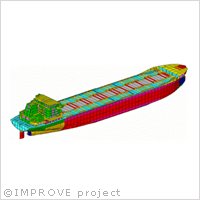EU project to build better ships by design
The EU-funded IMPROVE project is developing three next generation ship designs to keep the competitiveness of European shipbuilding afloat. As competition from the Far East intensifies, the only way for the once-dominant European shipbuilding industry to survive is to build on its technological advantage and offer ships with added value. Through the innovative use of advanced conceptual design and manufacturing techniques, the project will seek to develop concepts for small series and highly customised production environments, which will take into account important factors such as structure, production, operations, performance and safety at the pre-production stage of a ship's construction. Operators want ships that do not require any significant repair during the designed lifetime, and this is to be achieved through improved quality and performance. IMPROVE's targets include reducing manufacturing costs by 8 to 15% and production lead-times by 10 to 15%, as well as enabling a 5 to 10% reduction in the structural maintenance costs for ship owners. The team's conceptual design methods will be used for developing three types of competitive, next generation vessels, including Liquefied Natural Gas (LNG) carriers, chemical tankers and passenger ferry ships. 'The main novelty in the project will be at the conceptual design stage. Thanks to the mathematical models we are developing as part of IMPROVE, European ship builders will be able to offer optimised generic ship designs to clients,' explains Professor Philippe Rigo, the coordinator of the project from the University of Liège, Belgium. 'As these will also factor in such design characteristics as capacity, production costs, maintenance costs, availability, safety, reliability and robustness of ship structure at the early design phase, project proposals will also have a far greater price accuracy,' he added. The team hopes that the project's results will help the European shipbuilding industry to claw back some of the market share it has lost to its cheaper labour competitors, Korea and China. The project, funded under the EU's Sixth Framework Programme (FP6), involves 17 partners, including three ship owners, four universities, three shipyards, two ship design companies, two engineering companies, two software companies, a classification company and an International Association of universities.



